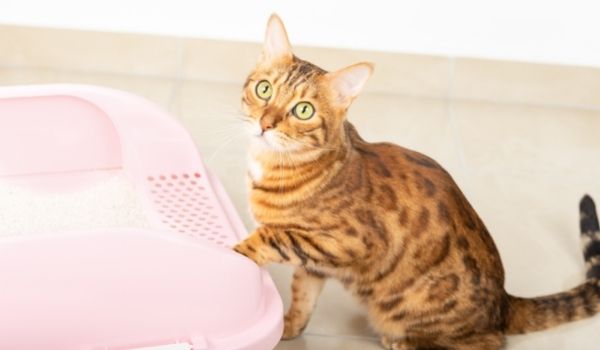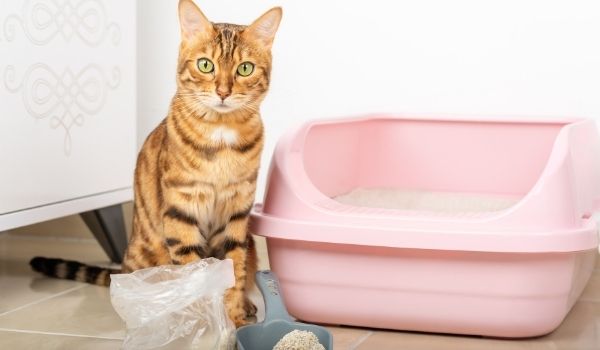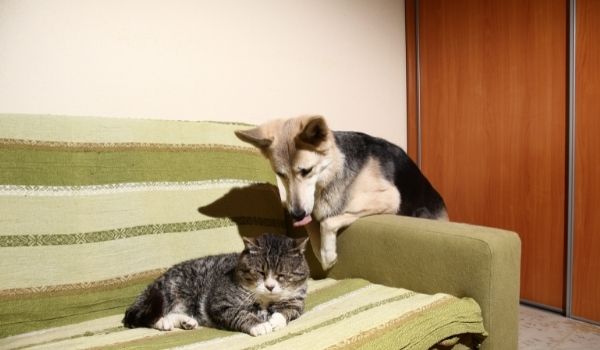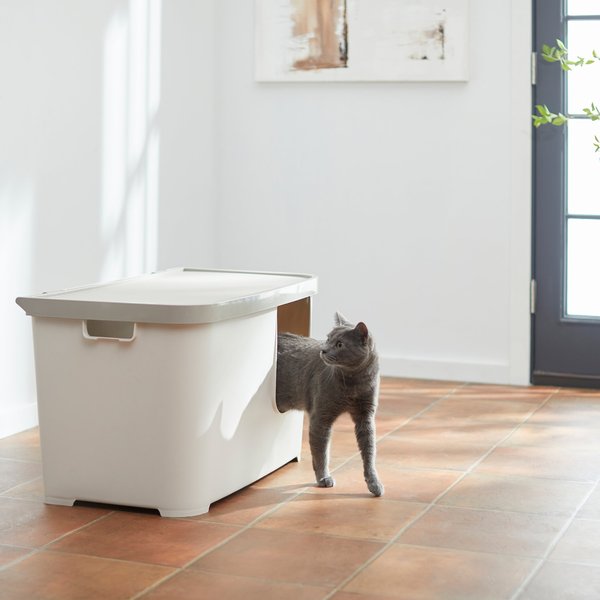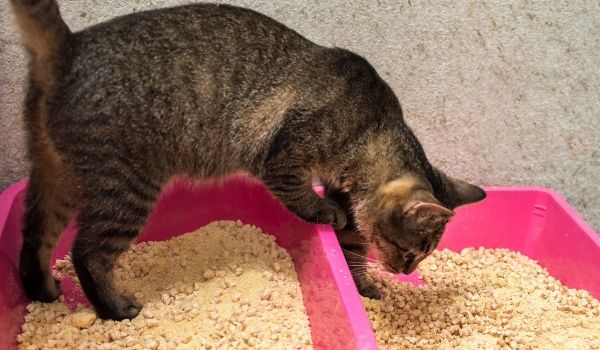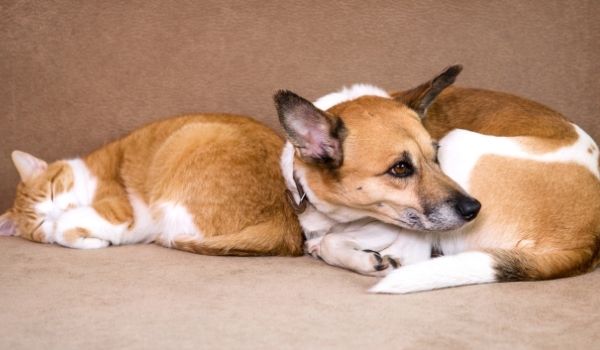Literally, problems rain cats and dogs when you have a cat and dog living together under your roof. Akin to the Tom and Jerry Show, both commit offenses (sometimes adorable) against each other. Cats and dogs often form a loving relationship, but most of the time, it is like the Tom and Jerry relationship.
Cat peeing on a dog bed is one of such problems. Do you find your cat’s urine on your dog’s bed? There is a whole bunch of reasons underlying cat urinating on dog bed. However, luckily, they are solutions too.
Let us find out why your cat is peeing on the dog’s bed and what can you do about it.
Why Is Your Cat Peeing on Dog Bed?
External Reasons
1. She Is Not Into the Litter Box
Cats may reject a seemingly awesome litter box for absolutely no reason – or at least one that is beyond our understanding. If your cat has received proper litter box training but is still not using the litter box, there might be something wrong with the litter box.
One reason that is most suspected is the design: it is quite possible that your kitty does not like the litter box because it has a cover that does not let the odor escape, thus making it smelly. Similarly, size can be a deciding factor. If your pet has issues with adjusting to the litter box to pee or poo, she will not want to sit in it anymore, especially if the pee or poo is getting on their fur. A dirty litter box can make your cat smell like poop.
So, given that cats are fastidious creatures, they would rather pee on the bed than enter the dirty litter box.
Finally, if it is located in a busy place, your cat will not use the litter box because felines prefer to do their ‘business’ in seclusion. Having said that, if your feline pal’s litter box has any of the faults discussed above, she will naturally find your canine pal’s bed a better option to pee at – especially if it is located well, open, and has a larger space.
2. She Hates the Litter!
Believe it or not, cats can be fussy when it comes to choosing the litter. Each cat may have certain preferences and likes and dislikes, which make them go for only a single type of litter throughout their lives. For instance, if the litter is hard, your cat may not like to step on it, especially if she is declawed. Likewise, felines can dislike heavily scented litter.
If the dislike for the litter persists, sooner or later, cats bid adieu to the litter box altogether and begin their voyage to find another pee spot. And you may find your cat peeing on a dog bed or probably on your bed. Before it comes to that, you should get the best clumping cat litter based on your cat’s preference and put it on autoship.
3. She Wants Two Litter Boxes
Some cats prefer to have separate litter boxes for peeing and pooing. If your cat is defecating in the litter box but urinating outside, probably she is one of those cats, and you need to get her another litter box. Likewise, cats only like to pee in clean litter boxes. Hence, if you do not clean your pet’s poop from the box, she might not come and pee in it as a protest.
Internal Reasons
4. She Has Medical Issues
If your cat displays unusual behavior in pee-related matters, suspecting health problems behind it is natural and – somewhat – recommended, especially because such cats do not give preference to using litter boxes when it comes to peeing. Instead, they try to find a suitable pee spot somewhere else. A dog bed, maybe?
The health issues, according to the American Animal Hospital Association (AAHA), that lead to a cat not using a litter box include:
- Arthritis
- Bladder stone
- Cancer
- Constipation
- Cystitis
- Diabetes
- Hyperthyroidism
- Kidney disease
- Urinary tract infection
Besides the problems listed above, an imbalance in a cat’s diet can also lead to litter box issues, making your cat pee on the dog bed.
5. She Marks Her Territory
Behavioral issues can exacerbate the tendency of kitties to pee in unusual places. One of such issues is territory marking. Cats may leave their urine on the places to say emphatically: “this belongs to me now.”
Such behavior is more common in male cats, especially unneutered ones. However, the problem can be more severe if your pet dog is a newcomer. Your cat might often leave their urine on his bed to claim the territory.
6. She Is Stressed
Unfortunately, anxiety and stress can easily alter the peeing habits of cats. Your pet can easily become stressed by the events that seem very natural and normal to you. Take, for instance, adding another pet into her life or shifting to a new place. In simple words, it always takes time for cats to adjust to the changing environment, and the stress of adapting to changes makes cats develop behavioral issues like not peeing in the litter box.
7. Your Cats Is In Heat
Female kittens start going into heat at the young age of four months. They will keep going into heat every 2 to 3 weeks until they get pregnant or spayed. In case of unwanted cat pregnancy, many owners have to consider spaying their pregnant cat, which results in the termination of pregnancy. So, if you don’t want to have to make such a difficult decision, you should get your kittens spayed before they get 4 months old.
Cat in heat mark places with its pee in the quest to attract potential mating partners. They are spreading their scent to increase the likelihood of tomcats come smelling their markings for mating.
If it is your intact female cat peeing on the dog’s bed and often howling, chances are she is on heat, and the act of peeing on the bed is “heat marking.” Besides the bed, she will also be marking (peeing on) many other things.
How to Stop Your Cat From Peeing on Dog Bed?
You can adhere to the following tips to save your pooch’s bed and have your kitty pee only in the desired place:
1. Clean the Dog Bed
Instinctively, cats return to the place they have urinated on before due to their strong marking intelligence. Therefore, it is very important to act quickly: remove the pee from the dog’s bed as soon as possible because the matter only gets worse with passing time. In addition, when left for too long, the smell cannot be removed with simple water and detergent.
After cleaning, do not forget to use odor eliminators like Pet Odor Exterminator Bamboo Breeze Fabric Spray. It can be used on all types of furniture and leaves a good fragrance around.
|
|
Urine Stain Cleaning Tip!
Mix warm water with vinegar and pour it onto the urine stain. When it dries, sprinkle baking soda on it and then vacuum the spot. This should clean the urine spot; however, if it persists, repeat the process two to three times.
2. Get Your Cat a Perfect Litter Box
Arranging the perfect litter box after carefully judging the litter habits of your kitty pet must be a priority for you. In general, it must be spacious so that your cat can comfortably sit and do her business. Entering and exiting the box should be easy. And do not forget to litter train your cat.
3. Place the Litter Box in a Hidden Area
As already discussed, cats do not like peeing in a place full of hustle and bustle. Therefore, it is pertinent to place her litter box in a somewhat hidden place, away from the sight of others. Moreover, the selected place must be quiet, and you must monitor your pet for some time to find if she likes the new, hidden place or not.
Frisco Multi-Function Covered Cat Litter Box is ideal because of its large size and covered sides, thus accommodating large kitties comfortably and keeping the pee sessions a private affair. Furthermore, its modern design blends into the home décor very easily.
|
|
4. Experiment With the Litter
It is not that simple to know which litter your cat may like and which one will she reject. To find the answer, bring an additional litter box with a different type of litter in it – say, for instance, if you have been using a soft litter, try bringing in the clay one and check if your cat shifts to the new one. If your cat comfortably shifts to the new one, hurrah! Mission successful! Check out our post on the best clumping litters for cats.
5. Use Pheromones Spray
Spray cat pheromones in the rooms where your kitty visits the most. This will keep her anxiety and stress levels low, thus decreasing the chances of her peeing on your dog’s bed due to stress and anxiety.
Feliway Optimum Enhanced Calming Pheromone is a vet-recommended natural pheromone to reduce stress symptoms in cats. Covering areas up to 700 square feet is one of the best solutions.
|
|
6. Calm Your Cat Down
If some big change has taken place in your home, try to keep the things under control by always giving attention to your cat and keeping her calm. You can use several tricks to calm down your cat, including keeping the noises around her low and playing soothing music. Doing so will keep her stress levels to the minimum, thus decreasing the chances of urination on your dog’s bed.
7. Add Extra Litter Boxes
Add a new and clean litter box into your cat’s living area. However, do not place it very close to the existing one. As your kitty will not go for the unclean litter box, she can use the clean one whenever she has an urge to pee, and it will give you a time slot to clean the dirty one.
Tip!
Always use different litter boxes for different cats because, generally, some kitties are reluctant to use the litterbox already used by the other one.
8. Keep Your Dog’s Bed Away From Your Cat’s Reach
Perhaps the easiest solution you can get is to keep your dog’s bed in a place that is unreachable to your cat. To do it simply, place the bed as far away as possible from the places which your cat visits frequently. Also, make sure that the bed does not look like a litter box.
9. Contact a Vet
If you suspect your cat is sick or overly stressed, it is always a wise idea to take her to the vet. It becomes necessary since cats are quite good at hiding their illnesses which makes them vulnerable to incurring bad health without you knowing. Besides, you can know the problem and relieve your cat if she suffers any pain because of it.
How to Make Harmony Between Your Cat and Dog?
You can try building some kind of bonhomie among your pets in the hope of reducing the chance of offensive acts, including peeing on each other’s beds.
Here are the tips to do so:
- Treat According to Personality: Do not raise your pets together if it is clear that they have different kinds of personalities, i.e., they cannot get along.
- Make the First Impression Count: The first impression matters the most when it comes to cats and dogs living together. Hence, always make sure that it remains the best part of their lives together.
- Separate the Bowls and Beds: Keep the beds and bowls of your cat and dog as far away as possible to reduce the chances of one interfering with the belonging of the other, thus ensuing animosity. This will also reduce the chances of cats eating dog food and dogs eating cat food.
- Exercise Them Regularly: Play with your pets often to make sure that they do not explode their energies on one another.
- Raise Them Together: If personalities match, make sure that your cat and dog are raised together to develop a sense of ‘familyhood.’ However, do it as early as possible.
Conclusion: Why Is Your Cat Peeing on Dog Bed?
Your cat is peeing on your canine pal’s bed due to several external and internal factors. As for the former, it could be associated with the dislike of litter boxes or the litter itself. For the latter, it is the stress, health issues, or some instincts that make her pee on the dog bed. Nonetheless, through some smart and effective measures, you can prevent this from happening.
Though it is a tedious task, as a pet owner, you must keep your cat and dog happy with each other. Happy petting!


